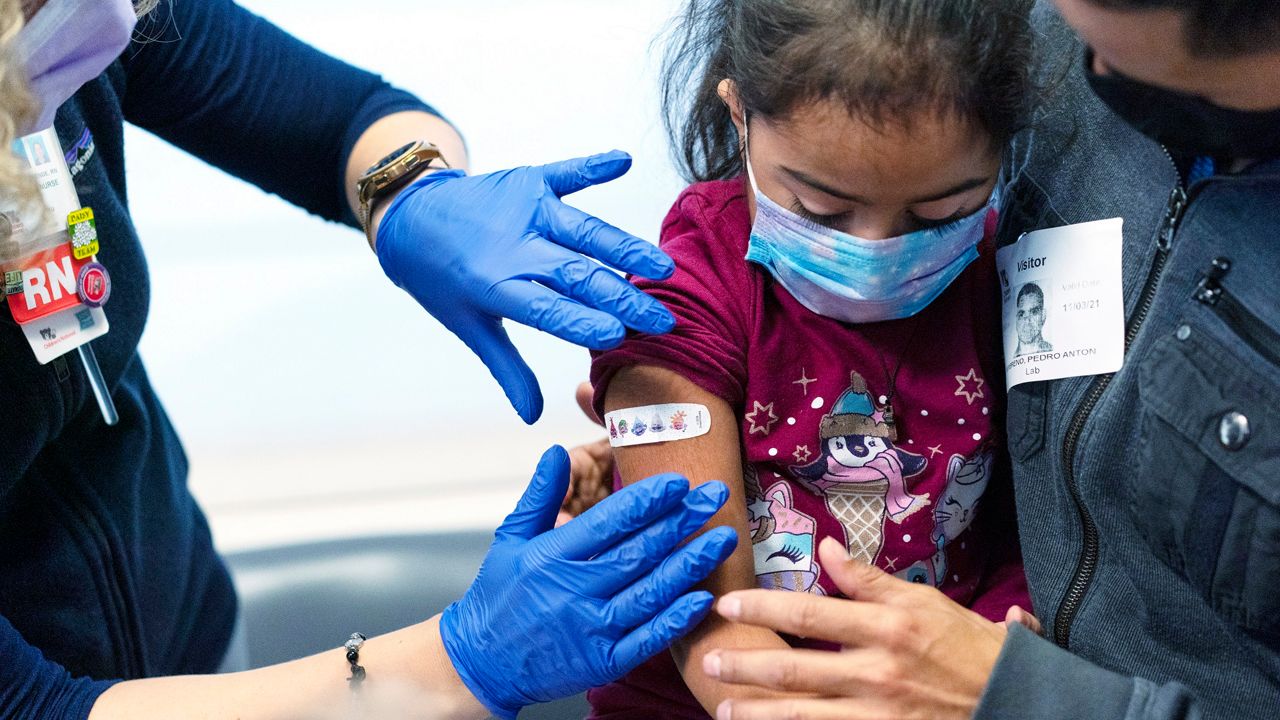The COVID-19 omicron variant sharply slashed the effectiveness of the Pfizer-BioNTech vaccine in preventing infection in children, a new study found.
What You Need To Know
- The COVID-19 omicron variant sharply slashed the effectiveness of the Pfizer-BioNTech vaccine in preventing infection in children, a new study found
- Despite the findings, the authors of the study are still recommending vaccinations for minors, citing their effectiveness in preventing hospitalization
- The researchers found that vaccine effectiveness against infection dropped from 66% to 51% in 12- to 17-year-olds and from 68% to 12% in 5- to 11-year-olds
- A preprint of the study, conducted by New York State health officials, was posted online Monday
Despite the findings, the authors of the study are still recommending vaccinations for minors, citing their effectiveness in preventing hospitalization.
The study by New York State health officials analyzed data from about 852,000 newly vaccinated adolescents 12 to 17 years old and more than 365,000 children ages 5-11 from Dec. 13, 2021, to Jan. 31, 2022, the height of the omicron surge.
They found that vaccine effectiveness against infection dropped from 66% to 51% in 12- to 17-year-olds and from 68% to 12% in 5- to 11-year-olds.
Omicron also cut, to a lesser degree, the level of protection against hospitalization. For older children, it fell from 85% to 73%, and for younger kids, it dropped from 100% to 48%.
A preprint of the study, which has not yet been peer reviewed, was posted online Monday.
“These results highlight the potential need to study alternative vaccine dosing for children and the continued importance (of) layered protections, including mask wearing, to prevent infection and transmission,” the study’s authors wrote.
The findings were made public as the last states, including New York, have begun dropping mask mandates in indoor public places, including schools. Many governors have cited falling COVID-19 case numbers, but also the availability of vaccines.
The Centers for Disease Control and Prevention began recommending the Pfizer vaccine for kids 5 to 11 in early November, meaning omicron was emerging as or already was the dominant COVID-19 strain when they received their second dose.
The vaccine has been available to kids 12 to 15 since last May, and for 16 and older since at least April 2021.
Younger children are administered a 10-microgram dosage, while adolescents and adults receive 30 micrograms.
The difference in dosage could explain the varying efficacy rates. The study found that during the last week of January, the vaccine effectiveness for 11-year-olds, who receive the lower dosage, was just 11%, compared to 67% in 12-year-olds, who were given the higher dosage.
Still, the scientists behind the study warned against interpreting their findings as an indictment of the vaccine.
“The data are not surprising as the vaccine was developed in response to an earlier COVID-19 variant and reduced effectiveness of 2 doses against the Omicron variant has been seen to some degree with all vaccines and ages,” New York State Health Department Commissioner Dr. Mary Bassett, one of the authors, said in a statement. “It is critical to stress that vaccination is still recommended for everyone 5 years and older, including children 5-11. These data also demonstrate that COVID-19 vaccines reduce the risk of more severe illness and hospitalization for children 5-11, and I encourage parents and guardians to consult their pediatrician about getting their children vaccinated, and boosted if eligible, as soon as they can.”
In a statement emailed to Spectrum News on Tuesday, Pfizer said it is evaluating a third 3-microgram dose for children 5-11 and a 3- or 10-microgram booster for 12-to 17-year-olds.
“Our updates earlier this year on pursuing a 3-dose schedule for the pediatric population were informed by the effectiveness data for three doses of the vaccine for people 16 years and older, and the early laboratory data observed with Delta and other variants of concern, including Omicron, which suggest that people vaccinated with three doses of a COVID- 19 vaccine may have a higher degree of protection, especially against severe disease and hospitalization,” the company said.
There is currently no vaccine available for children younger than 5. Pfizer last month postponed its request to the Food and Drug Administration seeking expansion of its emergency use authorization to include kids 6 months to 4 years old, saying it wanted more time to evaluate the clinical trial data on three 3-microgram doses.
Pfizer and BioNTech said in December that their trial found that a two-dose regimen did not generate a strong enough immune response in some children.
Note: This article was updated to include Pfizer's response.



